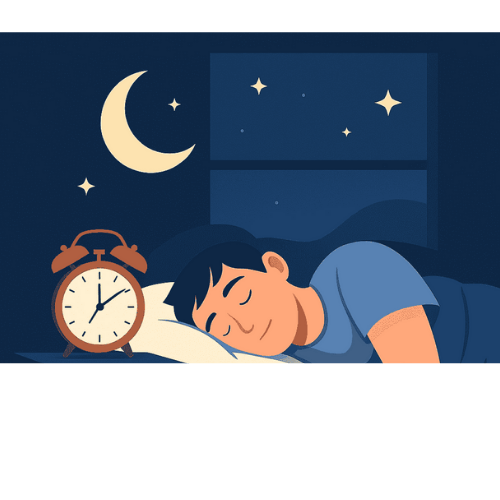Sleep Smarter: A Guide to Deep Rest and Morning Energy
Discover how to sleep smarter with science-backed tips for deep rest and energized mornings. Boost your sleep quality and wake up refreshed every day!
HEALTH & AWARNESS
Tapas Kumar Basu
4/25/20254 min read
In a world constantly fueled by caffeine, screens, and endless to-do lists, sleep has become a forgotten art. We chase productivity while sacrificing the very thing that sustains it: rest.
The truth is simple but powerful you don’t need more hours in the day; you need better sleep at night.
This guide isn’t about complex routines or expensive gadgets. It’s about understanding sleep, removing what blocks it, and rebuilding your relationship with rest so you wake up feeling truly alive.
Why Is Sleep So Important?
We often think of sleep as a passive activity just lying down and doing nothing. But sleep is one of the most active repair processes your body and brain undergo every day.
During quality sleep:
Your brain clears out toxins
Your immune system gets stronger
Your muscles repair and grow
Your emotions balance out
Your memory and focus sharpen
Lack of sleep doesn’t just make you groggy it ages your body, dulls your mind, and weakens your health.
According to the National Sleep Foundation, adults need 7–9 hours of sleep. But more importantly, they need quality sleep, with enough time in deep and REM stages.
The Science of Sleep: How It Works
Sleep happens in cycles, each lasting about 90 minutes. There are 4 stages:
Stage 1 (Light Sleep) – You drift in and out; this is when you're easily awakened.
Stage 2 – Heart rate slows, body temperature drops, brain waves slow down.
Stage 3 (Deep Sleep) – The most restorative part of sleep. Your body repairs tissues, builds bones and muscles, and strengthens immunity.
REM Sleep (Rapid Eye Movement) – Where dreams occur. This helps with memory, learning, and emotional processing.
A healthy night of sleep includes 4–6 cycles. Missing even one stage regularly (especially deep or REM) can impact your mental clarity, immunity, weight, and mood.
What’s Stealing Your Sleep?
Let’s be honest it’s not always stress or genetics. Sometimes it’s our daily habits that are ruining our sleep quality. Here are the most common culprits:
1. Blue Light Exposure
Your phone, tablet, or laptop emits blue light, which suppresses melatonin, the hormone responsible for making you sleepy. Using screens within 1 hour of bedtime can trick your brain into thinking it’s still daytime.
2. Inconsistent Sleep Timing
Sleeping at different times every night confuses your circadian rhythm your internal body clock. This makes it harder to fall asleep and wake up naturally.
3. Late-Night Stimulants
Caffeine, nicotine, and even sugar can stimulate your nervous system. Drinking coffee after 2 PM or eating heavy meals late at night can delay sleep or cause restlessness.
4. Mental Clutter
Worrying, overthinking, or replaying the day in your head can keep your brain alert long after your body is tired. Without a calming routine, your mind keeps spinning.
How to Sleep Smarter: 10 Simple Habits That Work
Building better sleep is less about effort and more about gentle discipline. Here are 10 habits you can build today:
1. Stick to a Sleep Schedule
Go to bed and wake up at the same time every day even on weekends. This strengthens your circadian rhythm, making it easier to fall asleep and wake up naturally.
2. Create a Wind-Down Routine
Signal your brain that it’s time to rest. Dim the lights, take a warm shower, do some light reading, or listen to soothing music. Avoid screens during this time.
3. Keep Your Bedroom a Sleep-Only Zone
Train your brain to associate your bed with rest, not work or stress. Avoid working, eating, or scrolling social media in bed.
4. Control Light and Temperature
Use blackout curtains or an eye mask. Lower the room temperature to 18–20°C. A cool, dark environment helps your body enter deep sleep faster.
5. Avoid Big Meals Before Bed
Give your body at least 2–3 hours to digest before sleeping. Heavy, spicy, or greasy food can cause heartburn and discomfort during the night.
6. Get Sunlight in the Morning
Exposure to natural light within 30 minutes of waking helps reset your biological clock. Just 10–15 minutes of sunlight can improve your sleep rhythm dramatically.
7. Move Your Body During the Day
Regular exercise even just 20–30 minutes helps you sleep more deeply. Avoid vigorous workouts late in the evening, as they may keep you awake.
8. Journaling or Gratitude Practice
Spend 5 minutes writing down your thoughts, to-do list, or things you're grateful for. This clears your mind and reduces anxiety before bed.
9. Avoid Alcohol or Smoking Before Bed
Though alcohol may make you sleepy initially, it disrupts sleep cycles. Smoking, on the other hand, is a stimulant and should be avoided.
10. Use Breathing or Relaxation Techniques
Try 4-7-8 breathing or guided meditations. These calm your nervous system and prepare your mind for sleep.
Wake Up Energized: Morning Habits That Support Sleep
Getting better sleep isn’t just about night rituals your morning matters too. Here's how to kick-start your day in a way that supports a better night’s rest:
Avoid the snooze button it confuses your brain and delays full wakefulness.
Hydrate before coffee to wake up your digestion and brain.
Stretch or move gently to increase blood flow.
Get sunlight on your skin or through your eyes it helps with melatonin regulation.
Avoid checking your phone for the first 20–30 minutes. Give yourself a peaceful start.
Helpful Tools for Better Sleep
You don’t need fancy gadgets, but a few supportive tools can help:
Sleep Apps: Sleep Cycle, Calm, or Insight Timer
White Noise Machines or Sleep Soundtracks
Weighted Blankets for anxiety and deeper sleep
Chamomile Tea, warm milk, or magnesium supplements (consult a doctor first)
Essential Oils like lavender for calming effect
How to Reset a Broken Sleep
If your sleep cycle is out of sync, don’t panic. Here’s how to reset it naturally:
Wake up at the same time every day (even if you slept late).
Expose yourself to sunlight early in the morning.
Avoid naps longer than 20–30 minutes.
Use the 10-3-2-1-0 Rule:
10 hours before bed: no caffeine
3 hours: no big meals
2 hours: no work
1 hour: no screens
0: the number of times you hit snooze
Stick to this for 5–7 days and your rhythm will begin to restore.
Final Thoughts: Sleep Is the Secret You’ve Been Ignoring
We often look for motivation, focus, and energy in the outside world but it all starts with rest.
When you sleep smarter, you wake up brighter, more creative, more focused, and more present.
So give yourself permission to prioritize sleep. It’s not laziness. It’s healing. It’s self-care. It’s one of the kindest things you can do for yourself.
Because when you sleep well, you live well.


Explore fitness, meditation, and healthy living tips.
© 2025. All rights reserved.
